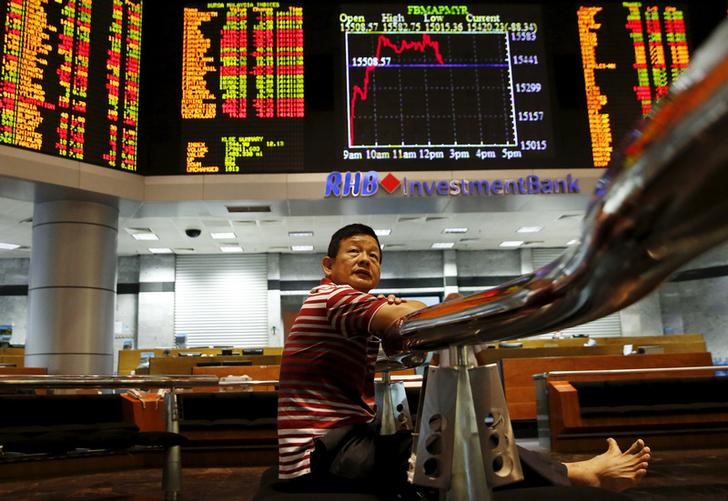By Hideyuki Sano and Nichola Saminather
TOKYO/SINGAPORE (Reuters) - Chinese shares slumped on Friday, weighing on other Asian stock markets, as a fresh regulatory crackdown and falling industrial profits weighed on market sentiment.
European shares were set to follow suit, with financial spreadbetters expecting Britain's FTSE 100 (FTSE) to fall 0.3 percent, France's CAC40 (FCHI) to open down 0.4 percent, and Germany's DAX (GDAXI) to start the day 0.1 percent lower.
U.S. stock futures (ESc1) erased gains after earlier rising 0.3 percent to their highest level since Nov. 9 following Thursday's Thanksgiving Day holiday.
Early selling intensified in China's stock markets in the afternoon, with the Shanghai Composite index <.SSEC> and the CSI300 <.CSI300> plunging 4.7 percent as of 0623 GMT, on track for the biggest one-day drop in more than three months, and set for weekly declines of 4.6 percent and 5 percent, respectively.
That contributed to a drop of 0.9 percent in the broadest index of Asia-Pacific shares outside of Japan (MIAPJ0000PUS), bringing losses for the week to 1.1 percent.Japan's Nikkei (N225) reversed earlier gains to close down 0.3 percent, but was on track to end the week flat.
China's securities regulator has urged domestic brokerages to cease financing clients' stocks purchases through swaps and other over-the-counter contracts, two sources with direct knowledge told Reuters, its latest move to reduce leveraged financing risk in its stock markets after a summer plunge.
"After rebounding over 20 percent from its bottom, you need fresh capital to maintain the upward momentum (in Chinese stocks), but recent government measures to deleverage have sparked fears," said Zhou Lin, analyst at Huatai Securities.
"In addition, I don't see signs that the economy has bottomed out."
Further weighing on sentiment was data on Friday showing that profits earned by Chinese industrial companies fell 4.6 percent in October, declining for the fifth consecutive month.
The Chinese yuan also came under pressure, weakening to its lowest level in almost three months as investors braced for a decision on Monday by the International Monetary Fund on whether to include the currency in its reserve basket.
Some market watchers fears Beijing's commitment to market reforms and liberalisation may cool if the yuan is added to the reserve basket.
Spot yuan
"It's uncertain if the Chinese government is keen to show the market influence in their rate setting or whether now that they know they have gained special drawing rights inclusion they are keen to weaken their overvalued currency knowing it will not jeopardise their case," Angus Nicholson, market analyst at IG in Melbourne, wrote in a note.
The euro continued to falter, hovering near seven-month lows on expectations that the European Central Bank could announce further stimulus as early as next week.
Most in the market expect the ECB to expand its asset purchase programme and lower its deposit rate, the rate at which banks park excess funds with it, when it meets next Thursday.
Traders are now speculating that the ECB could cut rates more than the previous market consensus of a 0.10 percentage point reduction.
The euro's three-month overnight indexed swap (OIS) rate
With keeping money in the euro seen increasingly costly because of negative interest rates, the common currency was on the defensive in the foreign exchange market.
The euro traded at $1.0614
"You keep losing money by holding the euro. It is hard to see the euro rising. True, it is already heavily shorted but I expect the euro to fall towards parity with the dollar," said a trader at a Japanese bank.
The euro's weakness helped the dollar hold near an 8-1/2-month peak.
The dollar index (DXY), which measures the performance of the U.S. currency against a basket of major peers, was little changed at 99.814, after scaling 100.170 earlier in the week, the highest since March. It is up 0.3 percent for the week.
The yen slipped 0.1 percent to 122.45 per dollar
Oil prices edged lower, with U.S. stockpile data on Wednesday doing little to ease concerns about a supply glut.
U.S. crude futures (CLc1) fell 1.4 percent to $42.45 a barrel as traders also unwound some of the buying they had made after Turkey shot down a Russian warplane earlier this week.
Brent futures (LCOc1) edged down 0.4 percent to $45.30 a barrel, compared to their two-week high of $46.50 hit earlier this week.
Battered metal prices also rebounded as hedge funds covered their short positions for now.
Benchmark copper on the London Mental Exchange

Zinc